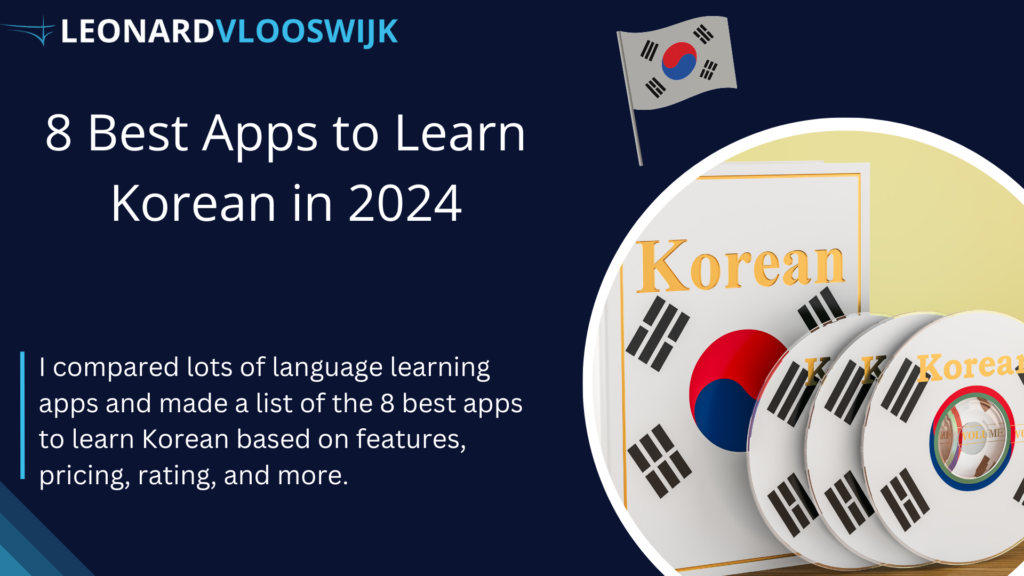Interested in learning Korean? Look no further! In today’s digital age, there are many apps that can help you learn Korean easily.
But, what are the best apps to learn Korean?
Whether you’re a beginner or have some experience, I’ve made a list of the 8 best apps to learn Korean that will offer fun and effective ways to improve your Korean skills.
Let’s explore the top apps together and find the perfect one for you!
First Things First: Why Should You Learn Korean?
Korean is becoming more popular worldwide, and there are good reasons for it. Maybe you love K-pop, Korean TV shows, or want to explore opportunities in South Korea. Learning Korean can be really fun and useful.
Korean culture is big right now. K-pop, Korean TV dramas, and food are everywhere. Learning Korean helps you understand and enjoy these cultural aspects even more. Plus, if you plan to visit South Korea, knowing Korean can make your trip better. You’ll find it easier to get around, talk to locals, and experience the country’s unique culture.
With over 75 million Korean speakers worldwide, learning Korean connects you to a large and diverse community. You can make friends from different backgrounds and share experiences with them.
In summary, learning Korean opens doors to new experiences and opportunities. Whether you’re into Korean culture, planning a trip, or want to boost your career, learning Korean can be a rewarding journey.
Let’s get right into my 9 best apps to learn Korean.
Quick Overview of the Best Apps to Learn Korean
| App | Best for | Base Price | What Makes It Stand Out | Review |
|---|---|---|---|---|
| 1. Rosetta Stone | Structured learning | Starts at $11.99/month | Immersive method and speech recognition technology | Rosetta Stone Review |
| 2. Pimsleur | Audio-centered approach | Va$14.95 to $19.95/month | Spaced repetition and real-world context | Pimsleur Review |
| 3. Italki | Personalized learning | Variable costs per lesson ($5 – $30 / tutor) | Wide selection of tutors and cultural exchange | Italki Review |
| 4. Babbel | Comprehensive language learning | Starts at $6.95/month | Interactive lessons and speech recognition | Babbel Review |
| 5. Busuu | Community learning | Starts at $6.66/month | Interactive lessons and personalized feedback | Busuu Review |
| 6. Duolingo | Gamified learning | Free (Optional in-app purchases) | Bite-sized lessons and gamification | Duolingo Review |
| 7. Mondly | Immersive learning | Starts at $10.00 / month | Real-world scenarios and diverse language options | Mondly Review |
| 8. FluentU | Authentic content immersion | Starts at $20/month | Extensive library of authentic videos and personalized learning | FluentU Review |
My Top 8 Best Apps to Learn Korean
1. Rosetta Stone
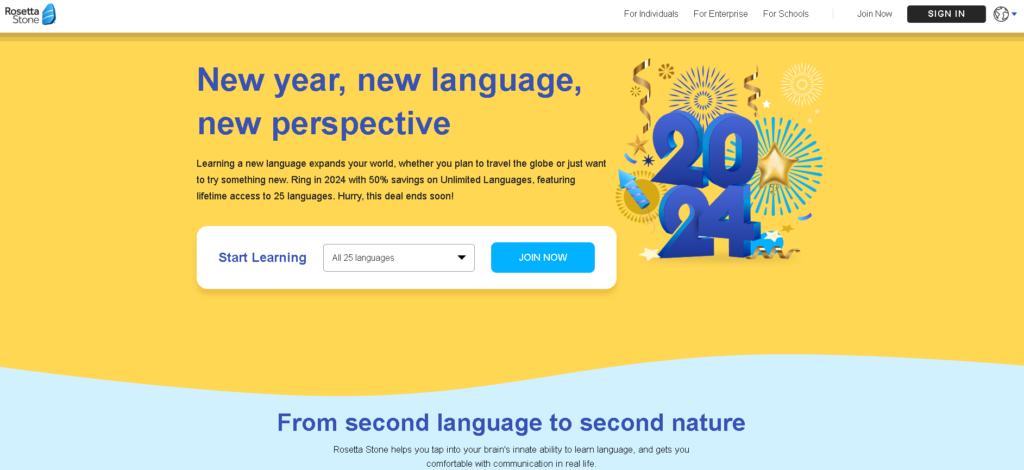
Best for: Beginners and visual learners who prefer immersive language learning experiences.
Base Price: The base price for Rosetta Stone varies depending on the language and subscription plan chosen. Generally, it offers monthly subscriptions starting around $11.99 per month and lifetime access options starting around $199.
What I Like About Rosetta Stone:
Rosetta Stone stands out for its immersive approach to language learning, which closely mimics the way we learn our first language as children. The program emphasizes vocabulary acquisition, grammar, pronunciation, and comprehension through interactive lessons and real-life scenarios.
Check out my Rosetta Stone review to see more!
Pros:
- Utilizes visuals, audio, and context for language acquisition without translation.
- Gradual progression aids steady learning for beginners.
- Enhances pronunciation and speaking skills.
- Convenient practice on-the-go with the app version.
Cons:
- Lacks detailed grammar and language nuance explanations.
- Subscription or lifetime access options may be costly compared to alternatives.
2. Pimsleur
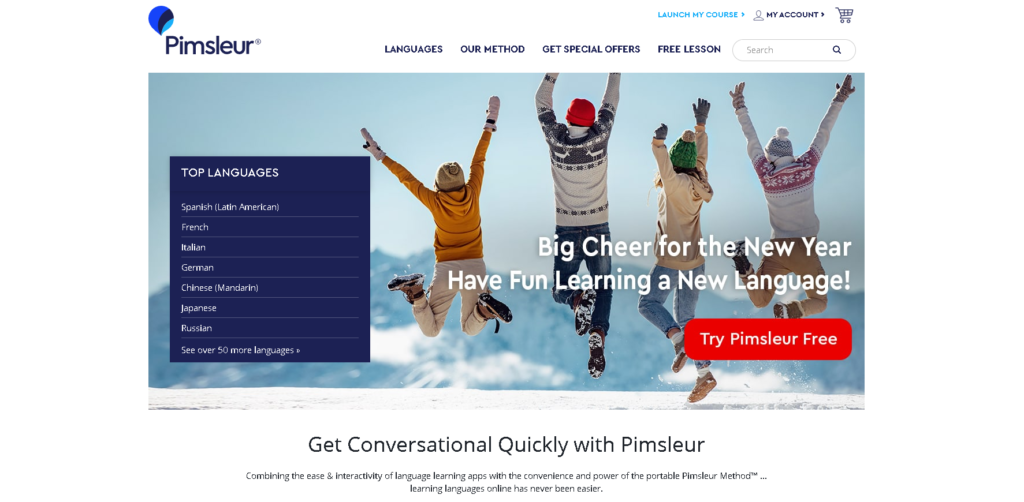
Best for: Auditory learners who prefer an audio-focused approach to language learning.
Base Price: Pimsleur offers various pricing options depending on the language and course format. Typically, prices start around $19.95 per month for a subscription or $119.95 for a Level 1 course.
What I Like About Pimsleur:
Pimsleur stands out for its audio-centered methodology, which is particularly beneficial for learners who excel in auditory learning environments. The content is diverse, covering lots of useful topics, and it adapts to your learning pace.
Check out my Pimsleur review if you haven’t already!
Pros:
- Pimsleur’s audio-centered approach aids in practicing pronunciation, listening, and conversation skills effectively.
- Spaced repetition techniques help retain vocabulary and grammar structures efficiently.
- Real-world scenarios provide practical language skills that can be used immediately.
- Downloadable audio lessons offer convenient study options anytime, anywhere.
Cons:
- Limited written material may not suit learners preferring visual aids or extra reading practice.
- Some may find Pimsleur’s pace slow, potentially causing frustration or feeling of slow progress, especially in the beginning.
3. Italki
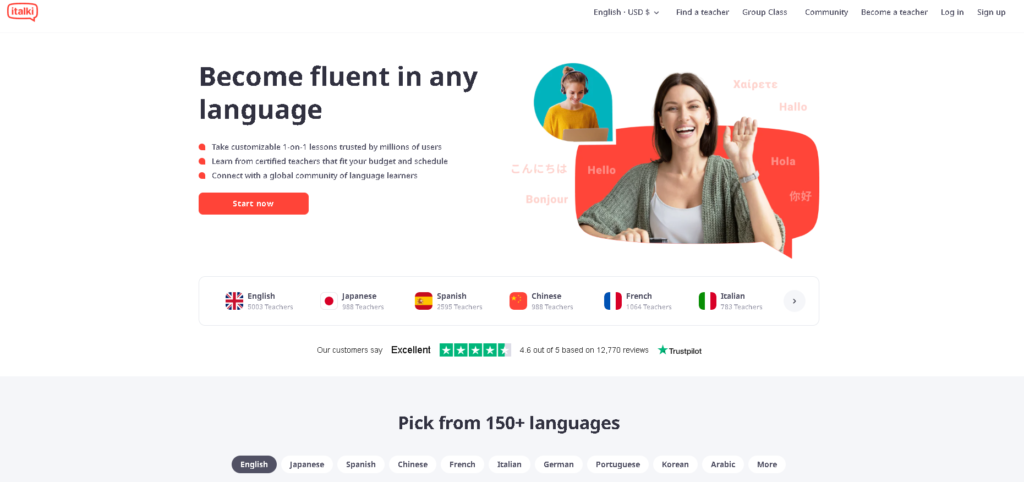
Best for: Individuals seeking personalized language learning through one-on-one lessons with native speakers or qualified tutors.
Base Price: Italki operates on a pay-per-lesson basis, allowing users to set their own budget by choosing from a wide range of tutors and their respective rates. On average, lessons can range from $5 to $50 per hour, depending on the tutor’s qualifications and experience.
What I Like About Italki:
Italki offers unparalleled flexibility and customization in language learning through its diverse pool of tutors and interactive platform. What I really like is that you can pick your own teacher based on how much money you’ve got.
I’ve covered everything you need to know in my Italki Review, go check it out!
Pros:
- Personalized Learning: Tailor learning experience to specific goals, interests, and proficiency levels.
- Convenience: Schedule lessons at home, eliminating need for commuting.
- Affordability: Control expenses with pay-per-lesson model and promotional discounts.
- Cultural Exchange: Connect with native speakers worldwide for insights into language and culture.
Cons:
- Quality Discrepancy: Varying tutor quality, teaching methods, and communication skills.
- Dependency on Self-Discipline: Success relies on learner’s commitment to regular practice and motivation.
4. Babbel
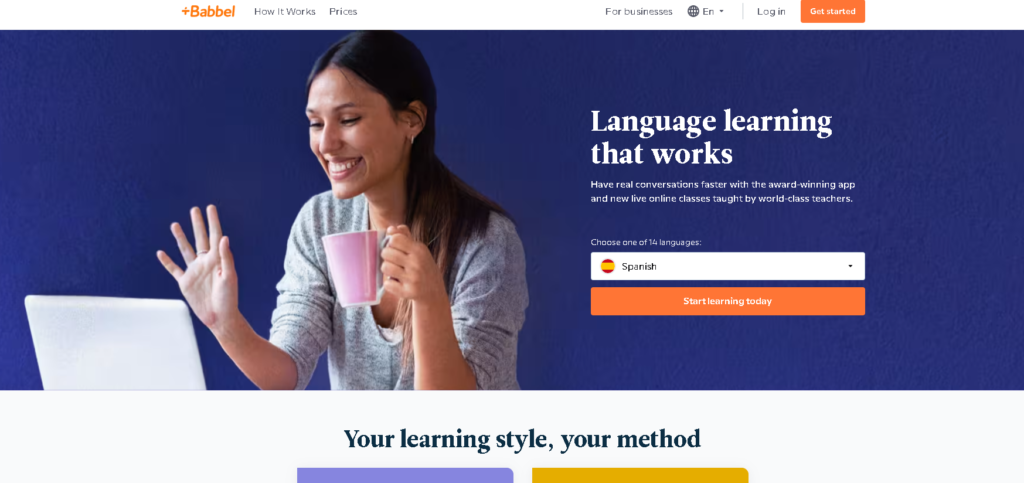
Best for: Beginners and intermediate learners looking for a structured and interactive language learning experience.
Base Price: Babbel offers subscription plans starting from around $6.95 per month, with discounts available for longer subscription durations. Prices may vary depending on the language and subscription plan chosen.
What I Like About Babbel:
Babbel impresses with its user-friendly interface, comprehensive curriculum, and focus on practical language skills. Its really one of my favourite apps to learn a language with, go check out my Babbel review for more!
Pros:
- Structured Curriculum
- Interactive Lessons
- Real-Life Situations
- User-Friendly Interface
Cons:
- Limited Language Selection
- Repetitive Content
5. Busuu
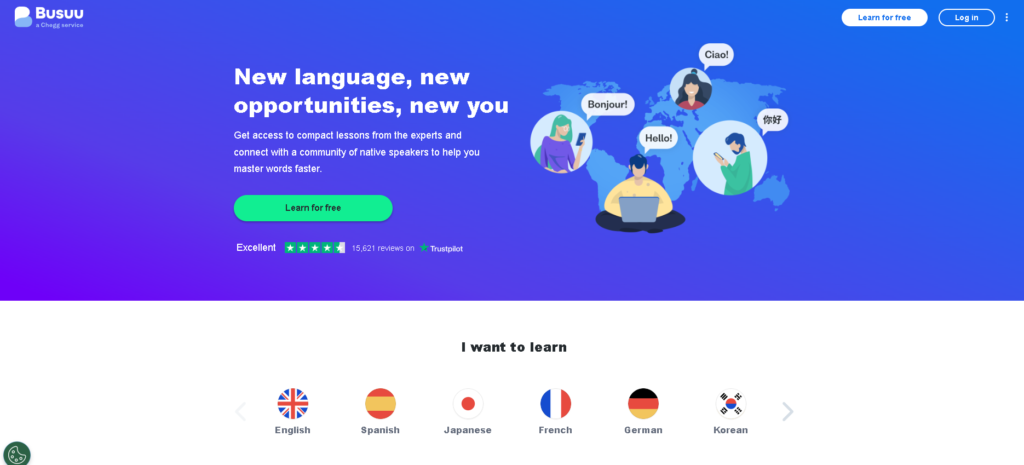
Best for: Individuals seeking a community-driven language learning platform with interactive lessons and personalized feedback.
Base Price: Busuu offers subscription plans starting from approximately $5.83 per month, with discounts available for longer subscription durations. Prices may vary depending on the language and subscription plan chosen.
What I Like About Busuu:
Busuu stands out for its collaborative approach to language learning, extensive lesson library, and emphasis on practical communication skills. Busuu is like a mix between Babbel, Mondly, and Rosetta Stone.
Check out my Busuu review now!
Pros:
- Community Learning
- Interactive Lessons
- Personalized Feedback
- Progress Tracking
Cons:
- Limited Free Content
- Technical Issues
6. Duolingo
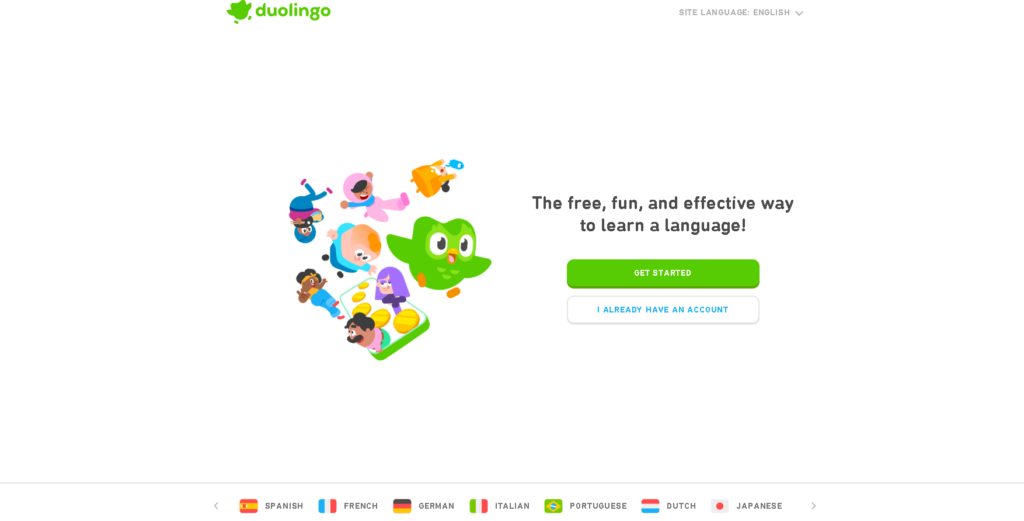
Best for: Beginners and casual learners seeking a fun and gamified approach to language learning.
Base Price: Duolingo offers a free version with optional in-app purchases for additional features like ad removal and offline access. Duolingo Plus, the premium subscription, starts at approximately $6.99 per month.
What I Like About Duolingo:
Duolingo excels in providing bite-sized lessons, gamification elements, and accessibility across multiple devices. The good thing about Duolingo is that you can use the free version without any limitations. If you want to now about Super Duolingo, you can check it out here!
Pros:
- Gamified Learning
- Bite-Sized Lessons
- Accessibility
- Community Features
Cons:
- Limited Depth
- Overemphasis on Translation
7. Mondly
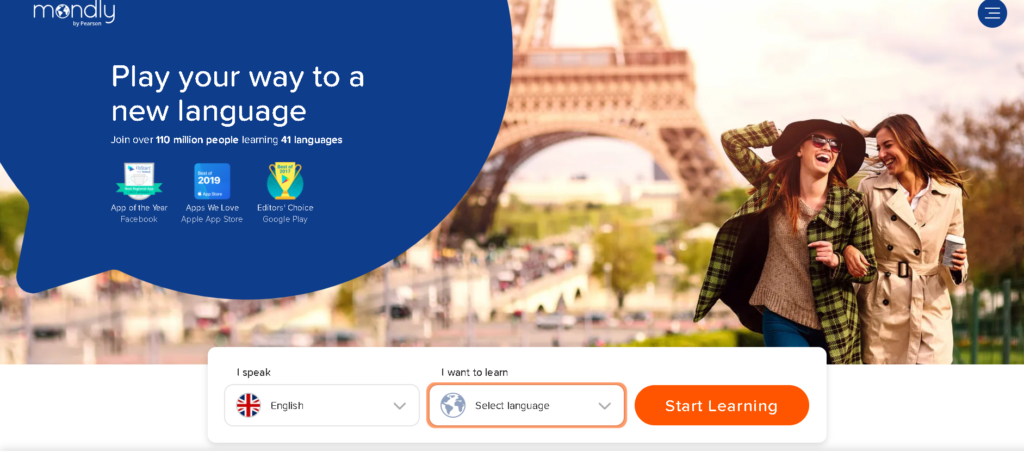
Best for: Individuals looking for a language learning app with a focus on interactive lessons and innovative features.
Base Price: Mondly offers subscription plans starting from around $9.99 per month, with discounts available for longer subscription durations. Prices may vary depending on the language and subscription plan chosen.
What I Like About Mondly:
Mondly impresses with its diverse range of languages, speech recognition technology, and immersive learning experience. The gamified elements make Mondly stand out between all the learning apps.
Check out my Mondly review for more!
Pros:
- Interactive Lessons
- Speech Recognition
- Immersive Learning
- Progress Tracking
Cons:
- Limited Depth
- Subscription Cost
8. FluentU

Best for: Language learners seeking immersive and authentic language learning experiences through multimedia content.
Base Price: FluentU offers subscription plans starting from approximately $30 per month, with discounts available for longer subscription durations. Prices may vary depending on the language and subscription plan chosen.
What I Like About FluentU:
FluentU stands out for its extensive library of authentic videos, interactive exercises, and personalized learning experience. I absoluteley love FluentU because of its unique approach to learning. Instead of memorizing words and grammar, you ‘just’ watch movies and learn on the go.
Check out my FluentU Review to see what it’s all about!
Pros:
- Authentic Content
- Interactive Exercises
- Personalized Learning
- Language Variety
Cons:
- High Price
- Limited Language Selection
How Long Does It Take to Learn Korean?
Learning Korean, like any language, varies greatly depending on various factors such as your native language, previous language learning experience, study habits, and the level of proficiency you aim to achieve. However, there are some general guidelines to consider.
Factors Influencing Learning Time:
- Language Background: If you speak a language with similarities to Korean, such as Japanese or Chinese, you may find some aspects of Korean easier to grasp, potentially shortening the learning time. Conversely, if Korean is vastly different from your native language, it might take longer to learn.
- Study Consistency: Regular and consistent study habits play a significant role in language acquisition. Daily practice, even for short periods, can contribute to steady progress.
- Learning Method: The effectiveness of your chosen learning method, whether it’s self-study through apps, online courses, attending classes, or immersion programs, can impact learning time and decides how hard it is to learn Korean.
- Language Goals: Your specific language goals, whether it’s basic survival phrases, conversational fluency, or achieving native-like proficiency, will influence the time needed to reach each milestone.
Estimates for Language Proficiency Levels:
- Basic Proficiency (A1-A2): For basic conversational skills and simple interactions, such as introducing yourself, asking for directions, or ordering food, it may take around 6 to 12 months of dedicated study.
- Intermediate Proficiency (B1-B2): Achieving a level where you can comfortably hold conversations on a wide range of topics, understand more complex grammar structures, and express opinions typically takes about 1 to 2 years of consistent study.
- Advanced Proficiency (C1-C2): Mastering Korean to an advanced level, where you can understand and discuss complex ideas, engage in professional or academic settings, and consume native-level media, may require 2 to 4 years or more of intensive study and immersion.
Additional Considerations:
- Immersion: Immersing yourself in the Korean language and culture through activities like watching Korean TV shows and movies, listening to Korean music, reading Korean books, and engaging with native speakers can accelerate learning.
- Language Challenges: Korean has its challenges, including its unique writing system (Hangul), intricate honorifics system, and grammar structure, which may require extra time and effort to grasp fully.
Ultimately, there’s no one-size-fits-all answer to how long it takes to learn Korean. Your learning journey will be unique, and progress will depend on your individual circumstances, dedication, and learning approach.
If you want to know the answer to the question ‘Is Korean Hard to Learn?’, you can check out my ‘Is Korean Hard to learn?’ article.
Best Ways to Learn Korean

Learning Korean can be a rewarding journey, and there are several effective methods to help you along your language journey. Here are some of the best ways to learn Korean:
- Korean Learning Apps: Utilize language learning apps like Duolingo, Rosetta Stone, Babbel, and FluentU. These apps offer interactive lessons, vocabulary drills, and grammar exercises tailored to different proficiency levels, making it convenient to practice Korean on-the-go.
- Korean Learning Books: Explore a variety of Korean learning books designed for different proficiency levels. From textbooks with structured lessons to grammar guides and vocabulary builders, Korean learning books provide comprehensive resources to enhance your language skills.
- Korean Podcasts: Listen to Korean podcasts dedicated to language learning. Podcasts offer authentic language input, improve listening comprehension, and expose you to various accents and speaking styles. Look for podcasts that focus on beginner-friendly topics or offer explanations in English to aid understanding.
- Korean Media: Immerse yourself in Korean media such as TV shows, movies, dramas, and music. You can also do this with FluentU! Watching Korean media exposes you to authentic language usage, cultural nuances, and colloquial expressions. Start with subtitles in your native language and gradually switch to Korean subtitles as your proficiency improves.
I’d recommend you try to learn Korean (or most other languages) by combining these learning methods. For example, you can learn Korean with Babbel, and listen to Korean podcasts at the same time.
By incorporating these diverse resources into your language learning routine, you can enhance your skills in reading, writing, listening, and speaking Korean while gaining insights into Korean culture and society.
Wrap-Up: Best Apps to Learn Korean
In wrapping up our talk about the best apps to learn Korean, it’s clear that each one has its own special features. Some are good for structured learning, like Rosetta Stone. Others, like Duolingo, make learning fun and interactive. And platforms like FluentU offer a more immersive experience.
Choosing the right app depends on your learning style and goals. These best apps to learn Korean give you lots of options to learn at your own pace and in your own way.
Remember, learning a language takes time and effort. Set small goals, stay motivated, and enjoy the journey. With these apps, you’ll make progress and have fun along the way.
Whether you’re learning Korean for travel, work, or just for fun, these are the best apps to learn Korean and they can help you reach your goals. So, don’t hesitate to try them out and start your Korean language adventure.
Frequently Asked Questions (FAQ)
1. Is Learning Korean Worth It?
Learning Korean can be highly rewarding, both personally and professionally. It opens doors to a rich culture, helps build connections with Korean speakers worldwide, and may offer career opportunities in various fields such as business, tourism, and entertainment.
2. Is Learning Korean Useful?
Yes, learning Korean can be very useful. Korea is a leading economy with a vibrant culture, and Korean language skills can enhance travel experiences, job prospects, and cultural understanding. Additionally, Korean language proficiency is increasingly in demand in sectors such as technology, finance, and international relations.
3. Is Learning Korean on Duolingo Good?
Duolingo can be a helpful tool for learning Korean, especially for beginners or casual learners. Its gamified approach makes learning fun and engaging, and it offers basic vocabulary and grammar practice. However, for more comprehensive learning and advanced proficiency, supplementing Duolingo with other resources may be beneficial.
4. Which Should I Learn: Korean or Japanese?
The choice between learning Korean or Japanese depends on various factors such as your interests, career goals, travel plans, and personal preferences. Both languages offer unique opportunities and challenges. Korean has a phonetic writing system (Hangul) and simpler grammar, while Japanese has a complex writing system (Kanji) and distinct honorifics. Consider your motivations and aspirations to make the best decision for you.
5. How Long Does It Take to Learn Korean?
The time it takes to learn Korean varies depending on factors such as your language learning background, study habits, and proficiency goals. Generally, achieving basic proficiency may take around 6 to 12 months, while reaching fluency can take several years of consistent study and practice.
6. What Are the Benefits of Learning Korean?
Learning Korean offers numerous benefits, including cultural enrichment, career opportunities, personal growth, and cognitive development. It expands your cultural horizons, fosters cross-cultural communication skills, and may open doors to travel, work, and educational opportunities in Korea and beyond.

